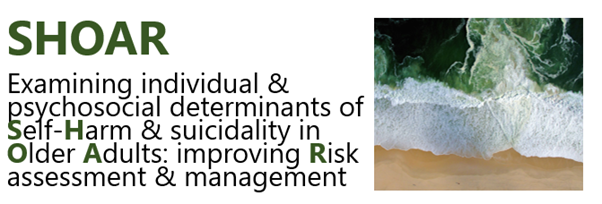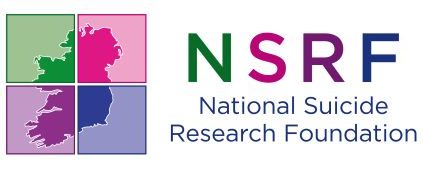Author: Dr Isabela Troya

SHOAR is a two-year study led by Dr Isabela Troya, funded by a Government of Ireland Fellowship (2022-2024). SHOAR aims to examine individual and psychosocial determinants of self-harm in older adults to improve risk assessment and management of self-harm in later life.
About the Project- What is SHOAR?
Self-harm, the act of harming oneself, is an increasing societal concern worldwide. Annually in Ireland, more than 400 people die by suicide and a further 12,500 present to hospital following self-harm, of which approximately 15% are older adults (aged >60).
Older adults who self-harm have a high risk of suicide. They have higher levels of suicidal intent compared to any other age group, placing them at higher suicide risk. Older adults who self-harm are 20 times more likely to die from unnatural causes, and 67 times more likely to die by suicide when compared to their peers who have not self-harmed.
Worldwide, the age group that is most likely to die by suicide is represented by older adults, in particular men. In Ireland, there is limited research examining self-harm and suicide in older adults. Specifically, the profile of older adults who self-harm is not well known, or what factors affect older people who self-harm.
To gain a better understanding of self-harm in older adults, and to inform policy, patients, clinicians, and the Irish healthcare system, this study will examine the factors that lead to older adults hurting themselves.
This is a multi-method study, using two large national databases (National Self-Harm Registry Ireland from the National Suicide Research Foundation and The Irish Longitudinal Study of Ageing from Trinity College Dublin) combined with primary research (interviewing health practitioners who support older adults).
Personnel Involved
Dr Isabela Troya is a Government of Ireland Fellow at the School of Public Health, University College Cork and the National Suicide Research Foundation. She leads the two-year study SHOAR, funded by the Irish Research Council.
Previously, Isabela was a Post-Doctoral Researcher on the Health Research Board funded programme led by Prof Ella Arensman ‘Individual and Area Level Determinants of Self-Harm and Suicide in Ireland: Enhancing Prediction, Risk Assessment and Management of Self-Harm by Health Services’. In her 2 years working in the HRB funded project, Isabela managed and co-led the development and implementation of an advanced skills training for health professionals supporting people who self-harm: Self-harm Assessment and Management Programme for General Hospitals (SAMAGH) Training Programme.
Dr Troya trained and qualified as a Clinical Psychologist (2015) at University San Francisco de Quito, Ecuador, and completed an MSc in Global Mental Health (2016) at King’s College London and London School of Hygiene and Tropical Medicine. Her PhD thesis, titled ‘Understanding self-harm behaviour in older adults was awarded PhD prize of the year (2020) by the UK’s Society for Academic Primary Care.
Steering Group
Isabela is supported by an advisory group made up of experts including clinicians, academics, and policy makers. These include:
Prof Ella Arensman, Professor in Public Mental Health UCC & Chief Scientist, NSRF
Dr Robert Briggs, Consultant Geriatrician St James Hospital, TCD
Prof Eugene Cassidy, Consultant Psychiatrist CUH & Clinical Professor, UCC
Dr Paul Corcoran, Head of Research, NSRF
Dr Eve Griffin, HRB EIA Research Fellow, UCC
Sally-Ann Lovejoy, Nurse Clinical Lead Self-Harm Programme, HSE
Dr James O’Mahony, Lecturer, UCC
Dr Faraz Mughal, Academic GP and NIHR Doctoral Fellow, Keele University
Prof Vincent Russell, National Clinical Lead Self-Harm Programme, HSE
Dr Mark Ward, Senior Research Fellow, TILDA, TCD
Recent Publications
Troya, M. I., Spittal, M. J., Pendrous, R., Crowley, G., Gorton, H. C., Russell, K., … & Knipe, D. (2022). Suicide rates amongst individuals from ethnic minority backgrounds: A systematic review and meta-analysis. EClinicalMedicine, 47, 101399.
Troya, M.I., Cully, G., Leahy, D., Cassidy, E., Sadath, A., Nicholson, S., . . . Arensman, E. (2021). Investigating the relationship between childhood sexual abuse, self-harm repetition and suicidal intent: Mixed-methods study. BJPsych Open, 7(4), E125. doi:10.1192/bjo.2021.962
Troya, M. I., Gerstner, R. M., Narvaez, F., & Arensman, E. (2021). Sociodemographic Analysis of Suicide Rates Among Older Adults Living in Ecuador: 1997–2019. Frontiers in public health, 9.
Cheung, G., Chai, Y., Troya, M. I., & Luo, H. (2020). Predictive factors of nonfatal self-harm among community-dwelling older adults assessed for support services. International Psychogeriatrics, 1-14.
Troya, M.I., Babatunde, O., Polidano, K., Bartlam, B., McCloskey, E., Dikomitis, L., Chew-Graham, C.A. (2019) Self-harm in older adults: a systematic review. British Journal of Psychiatry, 214(4), 186-200. doi:10.1192/bjp.2019.11
Troya, M. I., Chew-Graham, C. A., Babatunde, O., Bartlam, B., Mughal, F., & Dikomitis, L. (2019). Role of primary care in supporting older adults who self-harm: a qualitative study in England. British journal of general practice, 69(688), e740-e751.
Troya, M. I., Dikomitis, L., Babatunde, O., Bartlam, B., & Chew-Graham, C. A. (2019). Understanding self-harm in older adults: a qualitative study. EClinicalMedicine, 12, 52-61.

Contact
If you would like to contact us about this research, you can contact Dr Isabela Troya at isabela.troya@ucc.ie

